Projects
The HaFI initiates its own projects as an institute together with its network as well as in cooperation with institutional and individual partners. Their starting point can be themes or concepts from Harun Farocki, but also issues relating to documentary practices, changes in seeing and visibility, the work of images, and the work with images in general. Embedded in medium and long-term research processes, the projects are articulated in events and screenings, in publications, exhibitions, and educational offers.
A cinematic evening at the Veronetta Contemporanea Festival exploring the poetics and politics of resistance, existence, and relationality through the films of Anna Marziano, the 2024 HaFI residency recipient. In collaboration with HaFI.
June 3rd, 2025 — Projects / Event
 HaFI 023 is the result of a first effort to enhance the visibility of Teri Wehn Damisch’s film and television work, organized in 2022 at the Galerie Colbert (Paris) and the Centre Pompidou through a retrospective, an academic workshop and an exhibition. The booklet contains four texts by Teri Wehn Damisch, attending to the conception […]
HaFI 023 is the result of a first effort to enhance the visibility of Teri Wehn Damisch’s film and television work, organized in 2022 at the Galerie Colbert (Paris) and the Centre Pompidou through a retrospective, an academic workshop and an exhibition. The booklet contains four texts by Teri Wehn Damisch, attending to the conception […]
May 26th, 2025 — Projects / Publication
 The increasing entanglement of art and artists with the law is occurring during a time when the status of the legal has never been more precarious, given the far right’s aim to nullify, hollow out, or simply abolish the judicial apparatus altogether as part of its ongoing evisceration of the postwar liberal democratic order.
The increasing entanglement of art and artists with the law is occurring during a time when the status of the legal has never been more precarious, given the far right’s aim to nullify, hollow out, or simply abolish the judicial apparatus altogether as part of its ongoing evisceration of the postwar liberal democratic order.
March 18th, 2025 — Projects / Event
 This issue is dedicated to the work of filmmaker and artist Ingo Kratisch, who was also responsible for the camerawork in Harun Farocki's films for over three decades.
This issue is dedicated to the work of filmmaker and artist Ingo Kratisch, who was also responsible for the camerawork in Harun Farocki's films for over three decades.
March 4th, 2025 — Projects / Publication
 The times and spaces of colonialisms and neocolonialism are connected in ways that demand forms and languages of analysis that cannot and must not be reduced to those of science and administration.
The times and spaces of colonialisms and neocolonialism are connected in ways that demand forms and languages of analysis that cannot and must not be reduced to those of science and administration.
March 1st, 2025 — Projects / Event
 See post in German.
See post in German.
February 7th, 2025 — Projects / Event
 A workshop on the role of work for artificial intelligence as well as its legal implications for working conditions and copyright.
A workshop on the role of work for artificial intelligence as well as its legal implications for working conditions and copyright.
January 22nd, 2025 — Projects / Event
 "We need to believe that what we want to say has happened, because it remains true that only what really exists in us - our style and our time as objects of our knowledge - is worth the effort of being written." (Ingemo Engström in "About Narration")
"We need to believe that what we want to say has happened, because it remains true that only what really exists in us - our style and our time as objects of our knowledge - is worth the effort of being written." (Ingemo Engström in "About Narration")
January 9th, 2025 — Projects / Publication
 In exchange with the transversal seminar „Rehearsing the (extra-)jurisdiction of images“ at HEAD Genève / HES-SO.
In exchange with the transversal seminar „Rehearsing the (extra-)jurisdiction of images“ at HEAD Genève / HES-SO.
December 2nd, 2024 — Projects / Event
 Marziano's new film project connects to our research project “Terms and Conditions. The Legal Form of Images” [...].
Marziano's new film project connects to our research project “Terms and Conditions. The Legal Form of Images” [...].
November 26th, 2024 — Projects / Event
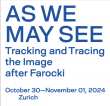 As part of the conference “As We May See: Tracking and Tracing the Image after Farocki” (30.10. – 1.11.2024).
As part of the conference “As We May See: Tracking and Tracing the Image after Farocki” (30.10. – 1.11.2024).
October 22nd, 2024 — Projects / Event
A cooperation with HaFI.
October 11th, 2024 — Projects / Event
 A two-part film program as part of our research project “Terms and Conditions: The Legal Form of Images”.
The second part is dedicated to the continuity of coloniality and (neo)colonial legal processes.
A two-part film program as part of our research project “Terms and Conditions: The Legal Form of Images”.
The second part is dedicated to the continuity of coloniality and (neo)colonial legal processes.
October 11th, 2024 — Projects / Event
 A two-part program as part of our research project “Terms and Conditions: The Legal Form of Images”.
The first part is dedicated to feminist film practices and the legal framework of moving images.
A two-part program as part of our research project “Terms and Conditions: The Legal Form of Images”.
The first part is dedicated to feminist film practices and the legal framework of moving images.
September 17th, 2024 — Projects / Event
 How can cinematic practices allow us to see and hear wounds of environmental and social injustice in spaces around us? With Susan Schuppli, Nora M. Alter, and Doreen Mende.
How can cinematic practices allow us to see and hear wounds of environmental and social injustice in spaces around us? With Susan Schuppli, Nora M. Alter, and Doreen Mende.
August 13th, 2024 — Projects / Event
 How devoid of imagery are "operational images"? With Tom Holert, Ute Holl, Katja Müller-Helle, Simon Rothöhler and Florian Sprenger - See post in German
How devoid of imagery are "operational images"? With Tom Holert, Ute Holl, Katja Müller-Helle, Simon Rothöhler and Florian Sprenger - See post in German
June 28th, 2024 — Projects / Research
 See post in German.
See post in German.
June 7th, 2024 — Projects / Event
 An event realized in the framework of the artistic research project “Terms and Conditions.”
An event realized in the framework of the artistic research project “Terms and Conditions.”
June 7th, 2024 — Projects / Event
 Susan Schuppli’s work examines material evidence from war and conflict to environmental disasters and climate change, currently focusing on learning from ice and the politics of cold. [...]
Susan Schuppli’s work examines material evidence from war and conflict to environmental disasters and climate change, currently focusing on learning from ice and the politics of cold. [...]
June 6th, 2024 — Projects / Event
 A booklet on Laura Mulvey and Peter Wollen's work as curators and filmmakers.
A booklet on Laura Mulvey and Peter Wollen's work as curators and filmmakers.
April 29th, 2024 — Projects / Publication
 HaFI's new artistic research project "Terms and Conditions. The Legal Form of Images" will inquire into the largely overlooked (or willfully ignored) legal and paralegal frameworks which increasingly inform the contemporary art and visual culture.
HaFI's new artistic research project "Terms and Conditions. The Legal Form of Images" will inquire into the largely overlooked (or willfully ignored) legal and paralegal frameworks which increasingly inform the contemporary art and visual culture.
April 4th, 2024 — Projects / Event
 With the volume "Bottroper Protokolle" (Suhrkamp 1968) [...] the television director and doctor of literature, committed feminist and communist Erika Runge (1939–2023) coined the term and practice of "Dokumentarliteratur" (documentary literature). [...]
With the volume "Bottroper Protokolle" (Suhrkamp 1968) [...] the television director and doctor of literature, committed feminist and communist Erika Runge (1939–2023) coined the term and practice of "Dokumentarliteratur" (documentary literature). [...]
December 20th, 2023 — Projects / Publication
 In her text, Natascha Sadr Haghighian grapples with the dialectics of looking in German structural racism by returning to the how’s and why’s of “not seeing” the NSU [...].
In her text, Natascha Sadr Haghighian grapples with the dialectics of looking in German structural racism by returning to the how’s and why’s of “not seeing” the NSU [...].
December 12th, 2023 — Projects / Event
 “We tried to get over this disturbance by learning to suppress the perception of racist structures. This in turn made it difficult to develop a commonality, a conversation about the experience of racism. [...] ”
“We tried to get over this disturbance by learning to suppress the perception of racist structures. This in turn made it difficult to develop a commonality, a conversation about the experience of racism. [...] ”
December 10th, 2023 — Projects / Publication
 Serving as an extensive guide to a key concept in contemporary art, design, and media theory, "Operational Images" explores the implications of machine vision and the limits of human agency. [...]
Serving as an extensive guide to a key concept in contemporary art, design, and media theory, "Operational Images" explores the implications of machine vision and the limits of human agency. [...]
December 1st, 2023 — Projects / Event
 Sicily, 2020. In a godforsaken landscape, a sudden change in weather finally marks the end of a suffocating summer. [...]
Sicily, 2020. In a godforsaken landscape, a sudden change in weather finally marks the end of a suffocating summer. [...]
November 28th, 2023 — Projects / Event
 Foscarini's research focuses on migration in the border areas between Bosnia-Herzegovina, Serbia and Croatia [...]
Foscarini's research focuses on migration in the border areas between Bosnia-Herzegovina, Serbia and Croatia [...]
November 21st, 2023 — Projects / Event
Sieh dir diesen Beitrag auf Instagram an Ein Beitrag geteilt von Duisburger Filmwoche (@duisburgerfilmwoche)
November 6th, 2023 — Projects / Event
 A film evening together with the theorist and filmmaker Domietta Torlasco.
A film evening together with the theorist and filmmaker Domietta Torlasco.
October 12th, 2023 — Projects / Event
 “The starting point is the relationship between Europe’s prosperity and Africa’s poverty; Europe’s destruction of societies and cultures, and the simultaneous use of Christianity and racial theories as justification for a massive exploitation of the colonized.” (SN)
“The starting point is the relationship between Europe’s prosperity and Africa’s poverty; Europe’s destruction of societies and cultures, and the simultaneous use of Christianity and racial theories as justification for a massive exploitation of the colonized.” (SN)
October 10th, 2023 — Projects / Publication
From the middle of September, critical theorist and filmmaker Domietta Torlasco is in Berlin for a month research stay at the Harun Farocki Institut.
September 21st, 2023 — Projects / Research
 A cooperation with the Berliner Gazette.
A cooperation with the Berliner Gazette.
May 24th, 2023 — Projects / Event
 A cooperation with HaFI.
A cooperation with HaFI.
May 24th, 2023 — Projects / Event
 "This is about at least four women. One of them fictional; all the others, infected by this fiction."
"This is about at least four women. One of them fictional; all the others, infected by this fiction."
February 20th, 2023 — Projects / Publication
 See German post.
See German post.
December 3rd, 2022 — Projects / Publication
 The retrospective explores the work of the Lithuanian filmmaker, anthropologist and archaeologist, whose focus was everyday life lived in the midst of war and in spite of it.
The retrospective explores the work of the Lithuanian filmmaker, anthropologist and archaeologist, whose focus was everyday life lived in the midst of war and in spite of it.
November 14th, 2022 — Projects / Event
A cooperation with the Berliner Gazette.
October 11th, 2022 — Projects / Event
With an exhibition and a panel discussion.
September 16th, 2022 — Projects / Event
 T2T is a project initiated by Moad Musbahi with Tom Holert/Harun Farocki Institut.
T2T is a project initiated by Moad Musbahi with Tom Holert/Harun Farocki Institut.
August 10th, 2022 — Projects / Event
 Presentation of the essay film by Hans Carlsson, realized as part of his Harun Farocki Residency in Berlin in winter of 2021/22 and a talk including Sarat Maharaj and Doreen Mende.
Presentation of the essay film by Hans Carlsson, realized as part of his Harun Farocki Residency in Berlin in winter of 2021/22 and a talk including Sarat Maharaj and Doreen Mende.
August 3rd, 2022 — Projects / Event
 A 14-channel installation by our 4th HaFI residency guest Cathy Lee Crane exploring the history of the western border between the United States of Mexico and the United States of America.
EXTENDED OPENING HOURS: Thu. July 28 from 4-7 p.m.; Tue. Aug. 2 from 1-5 p.m.
A 14-channel installation by our 4th HaFI residency guest Cathy Lee Crane exploring the history of the western border between the United States of Mexico and the United States of America.
EXTENDED OPENING HOURS: Thu. July 28 from 4-7 p.m.; Tue. Aug. 2 from 1-5 p.m.
July 4th, 2022 — Projects / Event
 In (X)-trACTION a collaborative of five media artists, including Cathy Lee Crane, share their latest works to reflect on and maybe even destroy the term “extraction.”
In (X)-trACTION a collaborative of five media artists, including Cathy Lee Crane, share their latest works to reflect on and maybe even destroy the term “extraction.”
July 1st, 2022 — Projects / Event
 CROSSING COLUMBUS and the short film ON THE LINE (2010) are distant companion pieces exploring the crossing of lines that mark Mexican territory.
CROSSING COLUMBUS and the short film ON THE LINE (2010) are distant companion pieces exploring the crossing of lines that mark Mexican territory.
July 1st, 2022 — Projects / Event
 Presented by HaFI on the occasion of Cathy Lee Crane's Harun Farocki Residency in Berlin.
Open Call deadline: July 15, 2022
Presented by HaFI on the occasion of Cathy Lee Crane's Harun Farocki Residency in Berlin.
Open Call deadline: July 15, 2022
June 27th, 2022 — Projects / Event
 “The first year group at the Filmhochschule München. Tabula rasa. Any long-held sentimentality about watching films was supposed to disappear, university knowledge shredded, scattered. All that remained was our own work and watching, watching, watching.” (Ingemo Engström)
“The first year group at the Filmhochschule München. Tabula rasa. Any long-held sentimentality about watching films was supposed to disappear, university knowledge shredded, scattered. All that remained was our own work and watching, watching, watching.” (Ingemo Engström)
May 24th, 2022 — Projects / Event
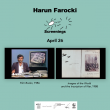 Part of "Coincidences in Prepositions", a publication program conceptualized to review questions, propositions and solutions that have been set up in the dis/continuities of many colonial milieus...
Part of "Coincidences in Prepositions", a publication program conceptualized to review questions, propositions and solutions that have been set up in the dis/continuities of many colonial milieus...
April 25th, 2022 — Projects / Event
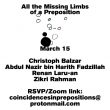 A series of non-thematic events on Zoom that discursify the inextricability of ‘prepositions’ and propositions...
A series of non-thematic events on Zoom that discursify the inextricability of ‘prepositions’ and propositions...
March 10th, 2022 — Projects / Event
 The issue is dedicated to Harun Farocki's only directorial work for the theatre.
The issue is dedicated to Harun Farocki's only directorial work for the theatre.
March 10th, 2022 — Projects / Publication
 A cooperation with the Berliner Gazette.
A cooperation with the Berliner Gazette.
February 22nd, 2022 — Projects / Publication
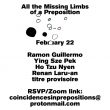 A series of non-thematic events on Zoom that discursify the inextricability of ‘prepositions’ and propositions...
A series of non-thematic events on Zoom that discursify the inextricability of ‘prepositions’ and propositions...
February 15th, 2022 — Projects / Event
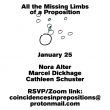 A series of non-thematic events on Zoom that discursify the inextricability of ‘prepositions’ and propositions in/from/with each other...
A series of non-thematic events on Zoom that discursify the inextricability of ‘prepositions’ and propositions in/from/with each other...
January 20th, 2022 — Projects / Event
 An insight into the research behind Farocki’s installation Comparison via a Third and its cinematic version In Comparison
An insight into the research behind Farocki’s installation Comparison via a Third and its cinematic version In Comparison
January 13th, 2022 — Projects / Publication
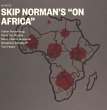 Showing Skip Norman's ON AFRICA.
Showing Skip Norman's ON AFRICA.
December 10th, 2021 — Projects / Event
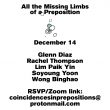 A series of non-thematic events on Zoom that discursify the inextricability of ‘prepositions’ and propositions...
A series of non-thematic events on Zoom that discursify the inextricability of ‘prepositions’ and propositions...
December 5th, 2021 — Projects / Event
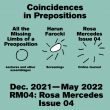 Coincidences in Prepositions is a publication program conceptualized to review questions, propositions, and solutions that have been set up in the dis/continuities of many colonial milieus...
Coincidences in Prepositions is a publication program conceptualized to review questions, propositions, and solutions that have been set up in the dis/continuities of many colonial milieus...
December 5th, 2021 — Projects / Publication
 Conceived as a year-long project, our partner Berliner Gazette will initiate diverse activities, most importantly a series of texts and a conference.
Conceived as a year-long project, our partner Berliner Gazette will initiate diverse activities, most importantly a series of texts and a conference.
October 1st, 2021 — Projects / Event
 The first HaFI book in collaboration with the Viennese publishing house Synema.
The first HaFI book in collaboration with the Viennese publishing house Synema.
September 15th, 2021 — Projects / Publication
 An online event organized by Journal of Visual Culture and HaFI.
An online event organized by Journal of Visual Culture and HaFI.
September 14th, 2021 — Projects / Event
 "Kein Schöner Archiv" documents the intangible cultural heritage of the postmigrant society.
"Kein Schöner Archiv" documents the intangible cultural heritage of the postmigrant society.
September 14th, 2021 — Projects / Event
 Our cooperation partners organize for the second time the Radical Film Network Meeting Berlin. With a contribution from Elske Rosenfeld based on the HaFI 014 pamphlet.
Our cooperation partners organize for the second time the Radical Film Network Meeting Berlin. With a contribution from Elske Rosenfeld based on the HaFI 014 pamphlet.
August 18th, 2021 — Projects / Event
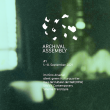 Das Arsenal organizes the first edition of the "Archival Assembly" festival, which brings together film archives and film archival projects, including HaFI, for an exchange with the public.
Das Arsenal organizes the first edition of the "Archival Assembly" festival, which brings together film archives and film archival projects, including HaFI, for an exchange with the public.
August 18th, 2021 — Projects / Event
 Volume 5, now released, brings together all of the texts published in the years 1986-2000 and offers insights into some of Farocki's seminal cinematic and installation works from this period.
Volume 5, now released, brings together all of the texts published in the years 1986-2000 and offers insights into some of Farocki's seminal cinematic and installation works from this period.
June 8th, 2021 — Projects / Publication
 In HaFI 014, artist Elske Rosenfeld reflects on the reading of the fragmentary archival materials for Farocki's unfinished film "Hard Selling" (1991) with her own text/image essay.
In HaFI 014, artist Elske Rosenfeld reflects on the reading of the fragmentary archival materials for Farocki's unfinished film "Hard Selling" (1991) with her own text/image essay.
April 8th, 2021 — Projects / Publication
 Contributions from individuals and communities both inside and outside of academia, in particular, from activists, artists, filmmakers, policymakers and researchers are welcome. Extended Deadline: February 15, 2021.
Contributions from individuals and communities both inside and outside of academia, in particular, from activists, artists, filmmakers, policymakers and researchers are welcome. Extended Deadline: February 15, 2021.
January 15th, 2021 — Projects / Publication
 Organized by the Berliner Gazette at Haus der Statistik from November 7 - 28, 2020. A cooperation with HaFI.
Organized by the Berliner Gazette at Haus der Statistik from November 7 - 28, 2020. A cooperation with HaFI.
December 14th, 2020 — Projects / Event
HaFI publications in Korean and Turkish
November 16th, 2020 — Projects / Publication
 A glimpse into the genesis of IMAGES OF THE WORLD AND THE INSCRIPTION OF WAR (1988).
To be released shortly, HaFI 013 can already be ordered at Motto Books.
A glimpse into the genesis of IMAGES OF THE WORLD AND THE INSCRIPTION OF WAR (1988).
To be released shortly, HaFI 013 can already be ordered at Motto Books.
November 6th, 2020 — Projects / Publication
 Organized by the Berliner Gazette, the Winter School “Silent Works” investigates possibilities for re-inventing ‘the school’ along the lines of ‘the factory.’
Organized by the Berliner Gazette, the Winter School “Silent Works” investigates possibilities for re-inventing ‘the school’ along the lines of ‘the factory.’
November 4th, 2020 — Projects / Event
 The Open Call runs until September 25, 2020.
The Open Call runs until September 25, 2020.
September 11th, 2020 — Projects / Event
 A panel discussion about Berlin vs. Amazon and the Berliner Gazette's Silent Works project, a partnership with HaFI.
A panel discussion about Berlin vs. Amazon and the Berliner Gazette's Silent Works project, a partnership with HaFI.
September 11th, 2020 — Projects / Event
 HaFI participation with a panel dedicated to Farocki and his TV collaboration with the WDR.
HaFI participation with a panel dedicated to Farocki and his TV collaboration with the WDR.
September 11th, 2020 — Projects / Event
 How can, how should these images be looked at? And how do they unsettle the contemporary gaze?
How can, how should these images be looked at? And how do they unsettle the contemporary gaze?
September 1st, 2020 — Projects / Publication
 A dossier consisting of documents and images on the "prison images" complex from the HaFI archive, compiled by HaFI.
A dossier consisting of documents and images on the "prison images" complex from the HaFI archive, compiled by HaFI.
May 26th, 2020 — Projects / Publication
 The issue #109 Navigation Beyond Vision II of the e-flux journal is now online.
The issue #109 Navigation Beyond Vision II of the e-flux journal is now online.
May 26th, 2020 — Projects / Publication
 A small selection of texts written by the outstanding film critic and translator Frieda Grafe, complemented by a speech from Harun Farocki.
A small selection of texts written by the outstanding film critic and translator Frieda Grafe, complemented by a speech from Harun Farocki.
April 22nd, 2020 — Projects / Publication
 The screening is part of the #Forum 50 series of the Berlinale.
The screening is part of the #Forum 50 series of the Berlinale.
February 28th, 2020 — Projects / Event
 Screening of the three-part WDR program on the “Other Cinema” (1969) - with Harun Farocki among others.
Screening of the three-part WDR program on the “Other Cinema” (1969) - with Harun Farocki among others.
January 6th, 2020 — Projects / Event
 The first presentation of the unfinished film HARD SELLING by Harun Farocki, which was recently found in the HaFI archive.
The first presentation of the unfinished film HARD SELLING by Harun Farocki, which was recently found in the HaFI archive.
November 15th, 2019 — Projects / Event
 The Public Screening is now being continued with a curated program by Stefan Pethke.
The Public Screening is now being continued with a curated program by Stefan Pethke.
September 2nd, 2019 — Projects / Event
 The booklet is dedicated to the WDR editor Werner Dütsch (1939-2018), who produced numerous films from Harun Farocki.
The booklet is dedicated to the WDR editor Werner Dütsch (1939-2018), who produced numerous films from Harun Farocki.
August 4th, 2019 — Projects / Publication
 New publication: Volume 4 of Farocki's Writings.
New publication: Volume 4 of Farocki's Writings.
August 4th, 2019 — Projects / Publication
 Premiere of the film and material unearthed in the archive of the Harun Farocki Institute will be shown beforehand.
Premiere of the film and material unearthed in the archive of the Harun Farocki Institute will be shown beforehand.
June 28th, 2019 — Projects / Event
 The current issue 101 on “Navigation Beyond Vision” is now online.
The current issue 101 on “Navigation Beyond Vision” is now online.
June 28th, 2019 — Projects / Publication
The video documentation is now online.
May 27th, 2019 — Projects / Event
What can archives do for today’s society? How are historical realities translated into contemporary narratives? Can transformation be archived?
May 7th, 2019 — Projects / Event
 Wild's first longer film is set between the fronts of the 1980s revolution in the Philippines (...).
Wild's first longer film is set between the fronts of the 1980s revolution in the Philippines (...).
April 25th, 2019 — Projects / Event
 In 1977 Ingemo Engström and Gerhard Theuring embark on a journey through France. They trace the escape route of the German emigration in France 1940/41 (...).
In 1977 Ingemo Engström and Gerhard Theuring embark on a journey through France. They trace the escape route of the German emigration in France 1940/41 (...).
April 24th, 2019 — Projects / Publication
HaFI is one of the participating institutions in Archive Außer Sich since 2017. A complete overview of our activities is now available on a dedicated website.
April 24th, 2019 — Projects / Event
 The meeting focuses on artistic/creative and political/ethical positions within global radical film cultures and video activism movements.
The meeting focuses on artistic/creative and political/ethical positions within global radical film cultures and video activism movements.
April 24th, 2019 — Projects / Event
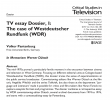 Texts and documents concerning the production context at "Westdeutscher Rundfunk", Cologne
Texts and documents concerning the production context at "Westdeutscher Rundfunk", Cologne
April 6th, 2019 — Projects / Research
 Navigation begins where the map ends (...).
Navigation begins where the map ends (...).
February 27th, 2019 — Projects / Event
 The film diverges from traditional ethnographic work and is instead a multi-layered media translation (...).
The film diverges from traditional ethnographic work and is instead a multi-layered media translation (...).
February 27th, 2019 — Projects / Event
 Contributions from individuals and communities both inside and outside academia, from artists, activists, filmmakers, researchers, scientists and others are welcome.
Contributions from individuals and communities both inside and outside academia, from artists, activists, filmmakers, researchers, scientists and others are welcome.
January 30th, 2019 — Projects / Event
 The film portrays the four wives of a marabout in Niger, enclosed in the eponymous courtyard of a building complex. They manage to develop micro-economic strategies to form relationships with the exterior world.
The film portrays the four wives of a marabout in Niger, enclosed in the eponymous courtyard of a building complex. They manage to develop micro-economic strategies to form relationships with the exterior world.
January 3rd, 2019 — Projects / Event
 A screening with Ali Hussein Al Adawy, the third Harun Farocki residency scholarship holder.
A screening with Ali Hussein Al Adawy, the third Harun Farocki residency scholarship holder.
October 25th, 2018 — Projects / Event
A cooperation event with HaFI.
October 23rd, 2018 — Projects / Event
 see German post
see German post
September 29th, 2018 — Projects / Publication
 Godard stopped traveling to foreign countries, his camera must not even drive around much by car.
Godard stopped traveling to foreign countries, his camera must not even drive around much by car.
September 15th, 2018 — Projects / Publication
 The film combines enacted scenes and historical material and is about the past and present of Levantkade in Amsterdam’s old harbor (...)
The film combines enacted scenes and historical material and is about the past and present of Levantkade in Amsterdam’s old harbor (...)
August 27th, 2018 — Projects / Event
 See German post.
See German post.
July 4th, 2018 — Projects / Publication
A discovery from Farocki’s estate will be shown on this occasion.
July 2nd, 2018 — Projects / Event
 A film about the legal process against the ‚Plowshares Eight‘, eight members of the Christian peace movement in US, who hammered a nuclear warhead to pieces at a weapon’s factory.
A film about the legal process against the ‚Plowshares Eight‘, eight members of the Christian peace movement in US, who hammered a nuclear warhead to pieces at a weapon’s factory.
July 2nd, 2018 — Projects / Event
Jürgen Ebert will present and talk about the last unpublished issue of the magazine, Filmkritik No. 335-336, Nov-Dec 1984, now released on the occasion of "Edit Film Culture!".
June 30th, 2018 — Projects / Event
 With a delay of over 33 years the last unpublished issue of the magazine, Filmkritik No. 335-336, Nov-Dec 1984, will now appear. This edition is dedicated to the filmmaker Emile de Antonio.
With a delay of over 33 years the last unpublished issue of the magazine, Filmkritik No. 335-336, Nov-Dec 1984, will now appear. This edition is dedicated to the filmmaker Emile de Antonio.
June 30th, 2018 — Projects / Publication
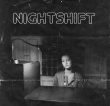 Nightshift explored the work of women in relation to politics, film, desire, and society.
Nightshift explored the work of women in relation to politics, film, desire, and society.
May 25th, 2018 — Projects / Event
 A reprint of the yearly indexes from 1975 to 1983, supplemented by the the index for 1984 which was still missing.
A reprint of the yearly indexes from 1975 to 1983, supplemented by the the index for 1984 which was still missing.
April 24th, 2018 — Projects / Publication
 The titles of Norman's films all hint at the struggle to assert an Afro-American identity in a world shaped by whites.
The titles of Norman's films all hint at the struggle to assert an Afro-American identity in a world shaped by whites.
March 15th, 2018 — Projects / Event
 Logik des Gefühls: What happens? Nothing much. […] Where is it set? In an in-between space, between lost love and a coming love. Winter. Berlin. 1981.
Logik des Gefühls: What happens? Nothing much. […] Where is it set? In an in-between space, between lost love and a coming love. Winter. Berlin. 1981.
December 22nd, 2017 — Projects / Event
 See German post.
See German post.
December 16th, 2017 — Projects / Publication
In the framework of the "Farocki Now" Academy, the UdK (University of the Arts) Berlin organises a LARP. Roles are still available upon registration.
October 17th, 2017 — Projects / Event
 A forum for workshops, presentations, and debates which explore the contemporary relevance of Harun Farocki’s work and thought, placing it in new contexts and activating its productive potential
A forum for workshops, presentations, and debates which explore the contemporary relevance of Harun Farocki’s work and thought, placing it in new contexts and activating its productive potential
September 18th, 2017 — Projects / Event
 See German post.
See German post.
September 18th, 2017 — Projects / Publication
 Tonight: Opening of the retrospective of Harun Farocki's work for cinema and television at Kino Arsenal.
Tonight: Opening of the retrospective of Harun Farocki's work for cinema and television at Kino Arsenal.
September 15th, 2017 — Projects / Event
 From “A for Adorno” to “Z for Zidane” – an ABCs of the Essay Film accompanied by a short text Farocki wrote in 1987.
From “A for Adorno” to “Z for Zidane” – an ABCs of the Essay Film accompanied by a short text Farocki wrote in 1987.
September 8th, 2017 — Projects / Publication
 A selection of materials pertaining to the film "Before Yor Eyes - Vietnam" introduced by a commentary penned by the Harun Farocki Institut.
A selection of materials pertaining to the film "Before Yor Eyes - Vietnam" introduced by a commentary penned by the Harun Farocki Institut.
September 8th, 2017 — Projects / Publication
 Political commitment, thirst for research and stamina. A film by Ogawa Productions.
Political commitment, thirst for research and stamina. A film by Ogawa Productions.
June 26th, 2017 — Projects / Event
 Factories and families as places of exploitation, which don’t just have to be interpreted but also changed.
Factories and families as places of exploitation, which don’t just have to be interpreted but also changed.
May 16th, 2017 — Projects / Event
 Documentary filmmaker Gerhard Benedikt Friedl describes Helmut Färber's method of teaching film history.
Documentary filmmaker Gerhard Benedikt Friedl describes Helmut Färber's method of teaching film history.
May 10th, 2017 — Projects / Publication
Helmut Färber’s 80th anniversary was celebrated by some (German language) texts in the media
April 26th, 2017 — Projects / Research
 A mythological road movie, a squatter and hacker story.
A mythological road movie, a squatter and hacker story.
March 17th, 2017 — Projects / Event
 See German post.
See German post.
March 10th, 2017 — Projects / Research
The talk will include the screening of "Ronny und Harun spielen Theater" which is a short documentary of a staged scene from “Etwas wird sichtbar” (“Before Your Eyes Vietnam”), 1982.
February 16th, 2017 — Projects / Event
 Harun Farocki saw the film in 1971 at the Hamburger Filmschau. In the succeeding years, he worked closely with Engström.
Harun Farocki saw the film in 1971 at the Hamburger Filmschau. In the succeeding years, he worked closely with Engström.
January 7th, 2017 — Projects / Event
See German post.
November 30th, 2016 — Projects / Research
Architecture, Instructional Technology, and the Social Production of Pedagogical Space Around 1970
November 30th, 2016 — Projects / Research
 Letters exchanged between Harun Farocki, Peter Weiss and Westdeutscher Runfunk (WDR): A glimpse at the production history of "On Display: Peter Weiss".
Letters exchanged between Harun Farocki, Peter Weiss and Westdeutscher Runfunk (WDR): A glimpse at the production history of "On Display: Peter Weiss".
November 11th, 2016 — Projects / Publication
For the Harun Farocki Institut, Peter Weiss’ 100th birthday on November 8, 2016 meant an opportunity to take a closer look at Farocki’s WDR program “On display: Peter Weiss”.
November 8th, 2016 — Projects / Research
A guided tour followed by a screening and a talk with Carles Guerra and Bert Rebhandl.
November 1st, 2016 — Projects / Event
See German post.
October 25th, 2016 — Projects / Research
We were isolated individuals and simultaneously subsumed into a totality*
October 12th, 2016 — Projects / Event
See German post.
September 15th, 2016 — Projects / Research
‘What is navigation?’ inquires the curatorial seminar 2016/17 of the CCC Research-Based Master Programms / Visual Arts Department of HEAD – Geneva.
September 5th, 2016 — Projects / Research
Expropriating Television.
September 1st, 2016 — Projects / Research
The Harun Farocki Institut organizes Farocki Now - A Temporary Academy as a component of the “Harun Farocki Retrospective”.
August 30th, 2016 — Projects / Event
 A working paper by Farocki (1975/76), a commentary by Tom Holert, Doreen Mende and Volker Pantenburg followed by a letter by Peter Nestler.
A working paper by Farocki (1975/76), a commentary by Tom Holert, Doreen Mende and Volker Pantenburg followed by a letter by Peter Nestler.
August 17th, 2016 — Projects / Publication
 The Institut's first public appearance at Berlinale 2016. A graffiti by Harun Farocki.
The Institut's first public appearance at Berlinale 2016. A graffiti by Harun Farocki.
February 7th, 2016 — Projects / Publication
 Material to investigate the present, the future past. Impressions from the archive of the Farocki Institut.
Material to investigate the present, the future past. Impressions from the archive of the Farocki Institut.
February 4th, 2016 — Projects / Publication






































































































